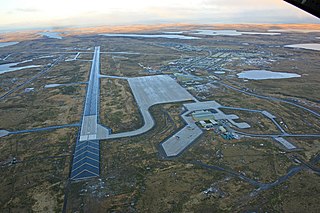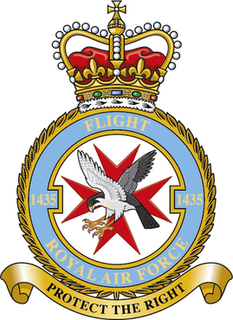Related Research Articles

The politics of the Falkland Islands takes place in a framework of a constitutional monarchy and parliamentary representative democratic dependency as set out by the constitution, whereby the Governor exercises the duties of head of state in the absence of the monarch and the Chief Executive acts as the head of government, with an elected Legislative Assembly to propose new laws and hold the executive to account.
The economy of the Falkland Islands, which first involved sealing, whaling and provisioning ships, became heavily dependent on sheep farming from the 1870s to 1980. It then diversified and now has income from tourism, commercial fishing, and servicing the fishing industry as well as agriculture. The islands use the Falkland pound, which is backed by sterling.

The Falklands War was a 10-week undeclared war between Argentina and the United Kingdom in 1982 over two British dependent territories in the South Atlantic: the Falkland Islands and its territorial dependency, South Georgia and the South Sandwich Islands. The result of the war was a British victory.

Margaret Hilda Thatcher, Baroness Thatcher, was a British politician and stateswoman who served as Prime Minister of the United Kingdom from 1979 to 1990 and Leader of the Conservative Party from 1975 to 1990. She was the longest-serving British prime minister of the 20th century and the first woman to hold that office. A Soviet journalist dubbed her the "Iron Lady", a nickname that became associated with her uncompromising politics and leadership style. As prime minister, she implemented policies that became known as Thatcherism.
The right of a people to self-determination is a cardinal principle in modern international law, binding, as such, on the United Nations as authoritative interpretation of the Charter's norms. It states that people, based on respect for the principle of equal rights and fair equality of opportunity, have the right to freely choose their sovereignty and international political status with no interference.

ARAGeneral Belgrano (C-4) was an Argentine Navy light cruiser in service from 1951 until 1982. Originally commissioned by the U.S. as USS Phoenix, she saw action in the Pacific theatre of World War II before being sold by the United States to Argentina. The vessel was the second to have been named after the Argentine founding father Manuel Belgrano (1770–1820). The first vessel was a 7,069-ton armoured cruiser completed in 1896.

RAF Mount Pleasant is a Royal Air Force station in the British Overseas Territory of the Falkland Islands. The airfield goes by the motto of "Defend the right" and is part of the British Forces South Atlantic Islands (BFSAI). Home to between 1,000 and 2,000 British military personnel, it is about 33 miles (53 km) southwest of Stanley, the capital of the Falklands – on the island of East Falkland. The world's longest corridor, 800 metres long, links the barracks, messes, and recreational and welfare areas of the station, and was nicknamed the "Death Star Corridor" by personnel.

The current flag of the Falkland Islands was adopted on 25 January 1999 and consists of a defaced Blue Ensign, with the Union Flag in the canton and the Falkland Islands coat-of-arms in the fly.

No. 1435 Flight is a Typhoon FGR. 4 unit of the Royal Air Force, based at RAF Mount Pleasant, providing air defence for the Falkland Islands, South Georgia and the South Sandwich Islands.
The Nootka Sound Conventions were a series of three agreements between the Kingdom of Spain and the Kingdom of Great Britain, signed in the 1790s, which averted a war between the two countries over overlapping claims to portions of the Pacific Northwest coast of North America.

No. 1312 Flight is an independent flight of the Royal Air Force, supporting at present the defence of the Falkland Islands..

The coat of arms of the Falkland Islands was granted to the Falkland Islands on 29 September 1948. It consists of a shield containing a ram on tussock grass in the field with a sailing ship underneath and the motto of the Falklands below.
Sovereignty over the Falkland Islands is disputed by Argentina and the United Kingdom.

The Falkland Islands Defence Force (FIDF) is the locally maintained volunteer defence unit in the Falkland Islands, a British Overseas Territory. The FIDF works alongside the military units supplied by the United Kingdom to ensure the security of the islands.

The Falkland Islands is an archipelago in the South Atlantic Ocean on the Patagonian Shelf. The principal islands are about 300 miles east of South America's southern Patagonian coast and about 752 miles from the northern tip of the Antarctic Peninsula, at a latitude of about 52°S. The archipelago, with an area of 4,700 square miles, comprises East Falkland, West Falkland, and 776 smaller islands. As a British overseas territory, the Falklands have internal self-governance, and the United Kingdom takes responsibility for their defence and foreign affairs. The Falkland Islands' capital is Stanley on East Falkland.

Falkland Islanders derive from various origins. Earliest among these are the numerically small but internationally diverse early 19th century inhabitants of the Falkland Islands, comprising and descended in part from settlers brought by Luis Vernet, and English and American sealers; South American gauchos who settled in the 1840s and 1850s; and since the late 1830s, settlers largely from Britain with a minority from other European countries. There has also been significant recent contributions from Saint Helena and Chile.

Desire Petroleum plc was an oil and gas exploration company headquartered in Malvern, England. It owned offshore exploration and production licences in the North Falkland Basin in the waters north of the Falkland Islands and its core focus was to develop the basin into a major new hydrocarbon province.
A referendum on political status was held in the Falkland Islands on 10–11 March 2013. The Falkland Islanders were asked whether or not they supported the continuation of their status as an Overseas Territory of the United Kingdom in view of Argentina's call for negotiations on the islands' sovereignty.
The Desire the Right Party (DRP) was a political party in the Falkland Islands, one of the only political parties in the history of the Falklands, which has traditionally acted as a non-partisan democracy. The other party that existed in the islands was the National Progressive Party, founded in 24 July 1964 and active for a brief time in the 1960s.

The Falkland Islands general election of 1989 was held on Thursday 12 October 1989 to elect members to the Legislative Council. Eight Councillors were elected through universal suffrage using block voting, four from each constituency.
References
- ↑ Wheeler, Tony (2005). The Falklands & South Georgia Island. Lonely Planet. p. 70. ISBN 9781740596435 . Retrieved 1 February 2013.
- ↑ Wagstaff, William (2001). Falkland Islands. Bradt Travel Guides. p. 18. ISBN 9781841620374 . Retrieved 1 February 2013.
- ↑ Mathieson, Ian (2003). "Falkland Islands/Islas Malvinas". Americas Review 2003-2004. Kogan Page. pp. 316–21. ISBN 9780749440640 . Retrieved 1 February 2013.
- ↑ Europa World Year Book 2. Taylor & Francis. 2004. p. 4461. ISBN 9781857432558 . Retrieved 1 February 2013.
| | This Falkland Islands-related article is a stub. You can help Wikipedia by expanding it. |
| | This heraldry-related article is a stub. You can help Wikipedia by expanding it. |